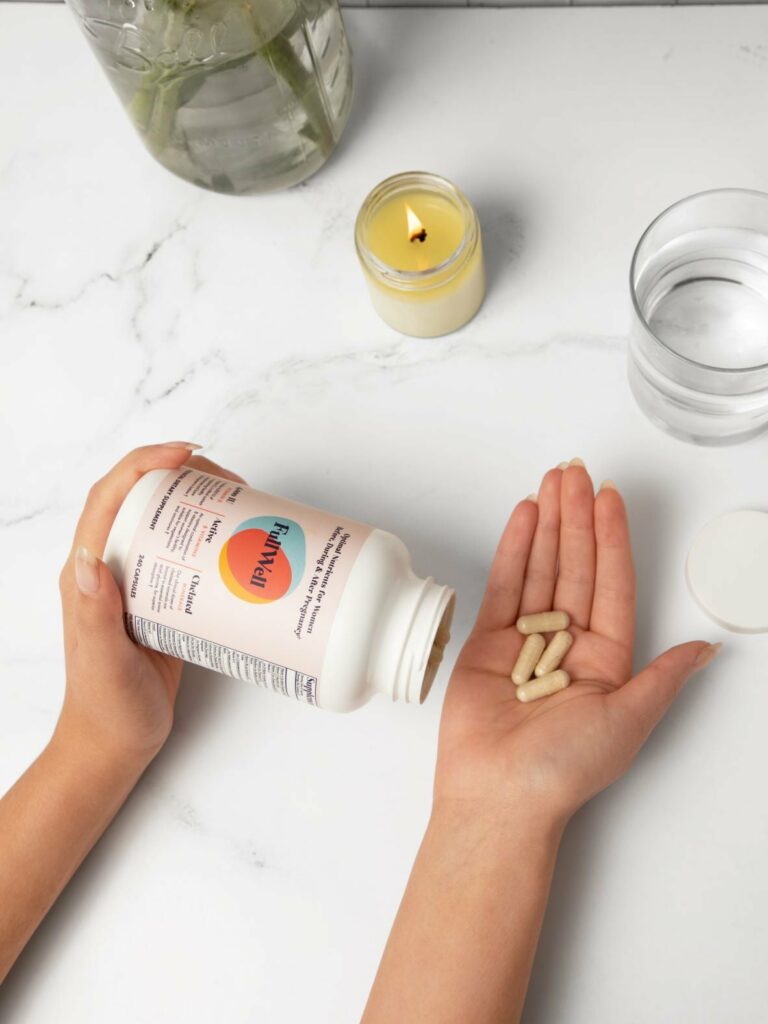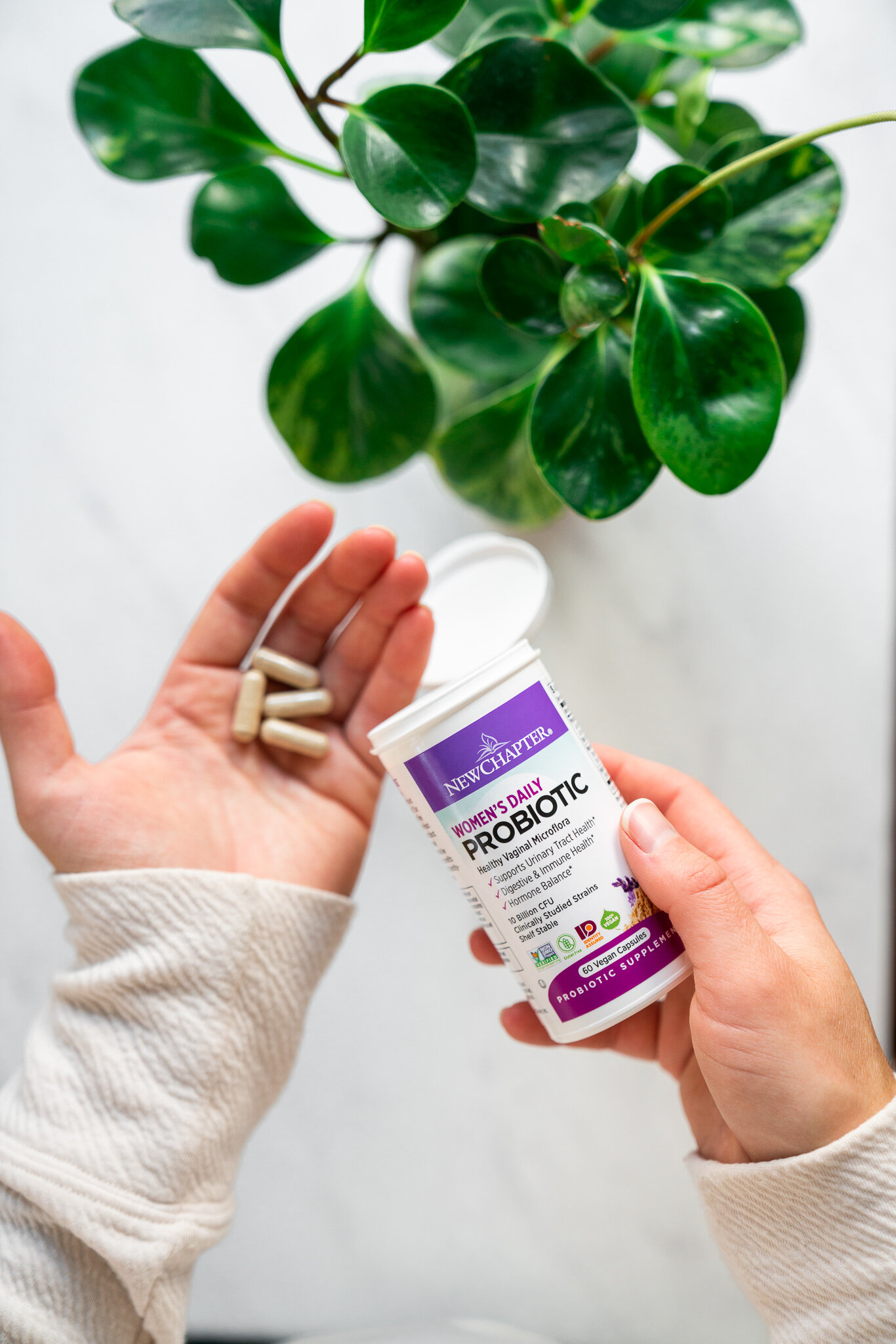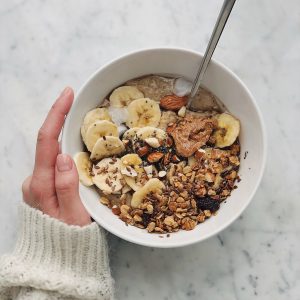If you are thinking about getting pregnant or just found out you are pregnant you may be wondering when to start taking prenatal vitamins? In this guide we are covering everything you need to know about when to start taking prenatal vitamins and what to look for when choosing the best prenatal vitamins for you and your pregnancy.

Congratulations mama! If you are reading this then you most likely are either starting the process of trying to get pregnant or maybe you just found out that you are pregnant! This is a really exciting time in any woman’s life, and my goal is to help make some of the common stressors and questions that can come up about prenatal vitamins and supplements a little less overwhelming.
As a mama-to-be there are a lot of things that you may be feeling overwhelmed by but choosing the right supplements for your pregnancy should not be one of them! As a dietitian, I am here to help take the confusion out of when to start taking prenatal vitamins, and how to choose the best options so you can feel educated and empowered in knowing that you have everything you need to best support both your body and your growing baby.
When To Start Taking Prenatal Vitamins?
So you just found out you are pregnant or are thinking about becoming pregnant and you may be wondering when to start taking prenatal vitamins — or if you even need to?
Hint hint: The Earlier The Better!
You should begin taking a prenatal vitamin at least three months, but ideally six months, before you would like to conceive.
While eating a whole foods diet for most of your nutrients is ideal, we know that it isn’t always that easy and most people need a little help filling in the nutrient gaps that our diets leave behind.
By taking a prenatal supplement at least three months before you hope to conceive, you can be sure that right from the start your baby will have all the nutrients it needs for healthy growth and development.
In fact, it is estimated that an egg can take up to 90 days to mature before ovulation, which means that those three months before pregnancy are a key window for improving egg quality and nutrient stores that will best support a healthy pregnancy.
If You Found Out You Are Pregnant Don’t Worry, Just Start Taking A Prenatal Multivitamin ASAP
But if you just found out that you are pregnant and haven’t been taking a prenatal supplement, don’t freak out! Most likely your current nutrient stores are enough to support your body and your baby, but ideally aim to start a prenatal supplement as soon as possible as a lot of development occurs within those first four weeks of pregnancy.
Additionally, if you are coming off of birth control soon before you would like to get pregnant, your body will most likely need to replenish vitamins and minerals such as folate, vitamins B2, B6, B12, vitamin C and E, magnesium, selenium and zinc, which are often depleted from birth control and can be found in most prenatal vitamins. [1]
Do You Need To Take Prenatal Vitamins?
I’ll keep this answer short. Yes, yes you do. Even the “best eaters” still have some gaps in their nutrition, and while you are pregnant your nutrient demands will be greatly increased as your nutrient stores are utilized to support your growing baby.
To help meet all of these growing demands for your body and baby, taking a prenatal multivitamin daily is recommended for all pregnant women, and women who would like to become pregnant within three months.

Vitamins And Nutrients To Look For In Your Prenatal Multivitamin
There are A LOT of prenatal vitamins and supplements available and the options can be a little overwhelming if you don’t know what you should be looking for. While I wish I could say that all prenatal supplements are created equal, that just isn’t the case.
Honestly, It will be nearly impossible to get absolutely all of your necessary nutrients from just one prenatal vitamin alone, and even though a prenatal multivitamin is important it still does not replace a balanced diet filled with lots of whole foods!
So while the following nutrients are absolutely ones that you should be looking for in a prenatal multivitamin, don’t forget to continue focusing on eating a balance of healthy fats, proteins, fruit and veggies and know that you may need to add a few additional supplements to round out your pregnancy supplement regimen (which I actually recommend and will talk about later).
Folate (look for a methylated folate over folic acid)
Folate is one of the most talked about nutrients for pregnancy and for good reason. It is essential for supporting neural tube development and DNA synthesis, both of which make it one of the most critical nutrients to supplement with during the early stages of pregnancy.
Folic acid is the synthetic form of folate that is most common in prenatal supplements, it is cheap so it is what has been most used in prenatal research, but in order for it to be absorbed by the body it needs the help of enzymes to convert it into a form that your body can use.
Unfortunately, up to 40% of all women actually have a gene mutation (known as the MTHFR gene mutation) that makes it difficult for them to convert folic acid into its bioavailable form. Even without the potential for MTHFR I always recommend choosing a prenatal vitamin that uses a form of methylated folate instead of folic acid for optimal absorption of this important nutrient. [2] [3]
Iron (27 milligrams)
Many women are iron deficient even before pregnancy, and with increased iron needs during pregnancy, it is not uncommon for many pregnant women to experience some degree of iron deficiency anemia during their pregnancy. For these reasons, choosing a prenatal that includes iron can help to meet mom’s iron needs during pregnancy and ideally help to prevent iron-deficiency anemia. However, iron can be constipating and if your iron stores are good you may not need it in your prenatal multivitamin, or you could supplement separately as needed. Just speak with your healthcare provider for your specific recommendations.
Zinc (12 milligrams)
Zinc is a nutrient that many women are deficient in, even with a healthy balanced diet. Because zinc plays a key role in so many important biological functions like protein synthesis, cellular division, and immune function it is essential to supplement with during pregnancy. [4]
Choline (450 milligrams)
Choline is one of the most important nutrients involved in supporting your baby’s brain development but may or may not be found in your prenatal vitamin. Pregnant women are recommended to consume 450 mg of choline each day, which can be met through diet or additional supplementation. The most common sources of choline in food can be found in eggs, milk, soy, chicken, beef, and peanuts. 1 egg equals roughly 150mg of choline.
If you do not feel that you can get enough of your choline nutrient needs through your diet alone then look for a prenatal or additional choline supplement to help meet those needs.
Calcium (1000 milligrams)
Calcium is a crucial nutrient for supporting healthy bone health both for mom and baby and is especially important during pregnancy, when your body is quite literally growing an entirely new set of bones for baby.
Iodine (220 micrograms)
Iodine helps to support thyroid health for both you and your baby, but during pregnancy your iodine needs actually double, which may make it difficult to get through food alone (the best source of iodine in food is iodized salt).
Vitamin A (1300 micrograms)
Vitamin A helps to form healthy skin and eyesight for your baby as well as bone growth.
Vitamin B6 (2 milligrams)
If you are experiencing morning sickness then vitamin B6 is going to be one nutrient that may help to bring you some relief. A typical dose of vitamin B6 for morning sickness is 25mg, three times a day.
Vitamin B12 (2.6 micrograms)
Vitamin B12 is another important vitamin that plays a role in preventing neural tube defects and supports the development of a healthy nervous system. Since vitamin B12 is mostly found in animal products, it can be difficult to achieve the necessary requirements on a plant-based and vegan diet, which makes supplementation all the more important.
Vitamin K (90 micrograms)
Vitamin K works with vitamin D to help ensure that calcium makes its way to the bones to support healthy bone development. It is also essential for normal blood clotting (this is why newborns are given a vitamin K shot in the hospital after birth before discharge).
Vitamin E (15 milligrams)
Vitamin E is an antioxidant rich vitamin that helps to protect your body (and your growing baby) from free radicals, and also helps the body form new red blood cells.
Vitamin C (85 milligrams)
Vitamin C is a powerful antioxidant and helps with the absorption of iron. While your prenatal supplement may include this nutrient, it also is readily available through a healthy prenatal diet via fruits and vegetables.
Vitamin D (minimum 1000 IU)
Vitamin D is best absorbed from the sun, but with so much of our days spent indoors or in colder climates, getting all our vitamin D needs from the sun isn’t always realistic. Because of this most people are chronically deficient in vitamin D, especially those who live in colder climates, which makes supplementation essential. For you and your baby, vitamin D plays a key role in supporting bone growth and development, as well as helping to promote better immune function. [5]
Selenium (60 micrograms)
Selenium is a trace mineral that is essential for supporting a healthy thyroid and helps to regulate your body’s immune function.
Copper (1000 micrograms)
Copper is a trace mineral that is needed in small quantities but provides a big impact as it is necessary for creating your baby’s heart, blood vessels, nervous system, immune system, and bones.

My Favorite (Dietitian Recommended) Prenatal Multivitamins
FullWell Prenatal Multivitamin
This FullWell Prenatal Multivitamin was designed by a fertility functional medicine dietitian and it is the GOLD STANDARD when it comes to prenatal multivitamins in my opinion. This is the prenatal multivitamin I take myself during pregnancy and postpartum, and recommend to all my clients, friends, and family. You can bet when my sister became pregnant I had her switch to this prenatal multivitamin right away.
From ingredient quality sourcing, to choosing the most up-to-date ingredients for formulation based on the most recent cutting edge fertility and prenatal nutrition research, this Full Well prenatal multivitamin checks every box.
Use the code MEGANF10 for 10% off your order
FullWell Vitality + Virility (for Men)
If you are in the process of trying to conceive let’s not forget about the role men play in the pregnancy process, and supporting optimal sperm quality is an important piece of the fertility puzzle that should be getting more attention. This mens fertility multivitamin is really one of a kind and is changing the way we approach reproductive health from the roles that BOTH men and women play.
Use the code MEGANF10 for 10% off your order
New Chapters One Daily Prenatal Multivitamin
What I love about New Chapter One Daily Prenatal Multivitamin is its unique blend of organic whole food based nutrients and herbs that have been fermented for increased absorption and are designed specifically for the increased needs of pregnancy. You can also find New Chapter’s One Daily Prenatal Multivitamin at many health food stores and they are working on making it even more available in larger retailers like Target. New Chapter’s One Daily Prenatal Multivitamin also includes methylfolate to help you meet your increased folate needs, choline, and fermented iron which is non-constipating and much easier to digest.
If you are having an issue taking your prenatal vitamins due to nausea/hyperemesis, the added stomach soothing benefits of peppermint, lemon balm and clinically studied ginger in this prenatal vitamin could be more palatable than other prenatal vitamins, which may increase nausea symptoms in the first trimester.*

What Other Supplements Should You Consider Adding During Pregnancy?
Omega-3’s (minimum of 650 milligrams)
Omega-3 fatty acids (EPA and DHA) are essential fatty acids which our body needs to consume through food or supplementation. Omega-3 fatty acids are key components of healthy cell function and play a big role in supporting the building blocks of your baby’s brain, retina, and nervous system. Omega-3’s have also been linked to a healthier immune response in infants whose mothers supplemented with omega-3’s during pregnancy.
On top of all those positive benefits for baby, omega-3’s also help to reduce inflammation in the mom’s body and have been shown to help support healthy labor and delivery outcomes, as well and mom’s mood postpartum.
Omega-3’s are especially important to start adding to your pregnancy supplement routine in the third trimester when so much of babies brain (which is mostly made of fat) is developing. [6] [7]
Vitamin D
While your prenatal supplement may include some vitamin D, it again may not be enough to meet all of your vitamin D nutrient needs. I often will recommend that folks get their vitamin D levels tested at the beginning of pregnancy with an ideal level over 40 being the goal. If you find that your vitamin D levels are deficient most women will benefit from supplementing with a daily dose of 2000-4000IU/day, but some women may need even more. Always consult with your doctor for personalized medical guidance.
Probiotics
There are a lot of changes that happen to your gut and digestion during pregnancy due to increased hormones that may slow down digestion and could impact your gut health, as well as changes to your vaginal microflora and urinary tract that make yeast infections and UTIs common issues that many pregnant women have to deal with during pregnancy.
To help support a strong immune system, while also keeping your gut flora, as well as your vaginal microflora and urinary tract healthy throughout pregnancy I always recommend adding an additional probiotic! I personally, love that the New Chapter Perfect Prenatal does include some probiotics right in their prenatal, but would also recommend supplementing with a women’s daily probiotic that can help meet the specific needs we have as women, especially during pregnancy.
Magnesium
Magnesium is the ultimate calming mineral and can really help to improve digestion, relieve constipation, reduce anxiety, and decrease muscle cramps that can happen during pregnancy. Your prenatal may contain magnesium already, but if you are experiencing any of the above symptoms it may be a good idea to also add a magnesium supplement of ~300mg/day to help improve some of the above pregnancy related symptoms.
You can also absorb magnesium through your skin via Epsom salt baths if you are out of your first trimester, just make sure not to get the water too hot that it raises your body temperature to an unhealthy level for baby.
Choline
Like I mentioned before, choline is one of the most important nutrients to be consuming during pregnancy, and unfortunately it is not talked about nearly enough and is a nutrient that most people are deficient in. Since most prenatal supplements do not contain choline, or only contain a very small amount that is not going to meet all your prenatal nutrition needs, this will be one nutrient that you should consider supplementing with in addition to your prenatal.
Iron
While iron may be a part of your prenatal supplement, it is also one mineral that often needs to be supplemented additionally in higher quantities on its own, especially as pregnancy progresses. Iron deficiency anemia is very common in pregnant women, particularly as we near the end of the second and third trimester. Most likely around this time your hemoglobin and hematocrit levels will be checked by your doctor and if additional supplementation is required they will let you know.
However, do not be afraid to speak up if you are feeling particularly weak or exhausted. Sometimes your iron levels could be borderline deficient and you could benefit from added supplementation.

Recap: When To Taking Prenatal Vitamins?
While there are a lot of things to learn and decisions to make as a mama-to-be, choosing high quality prenatal supplements to support your nutrition and your baby’s development should be at the front of your list as they will greatly improve how you feel and how your baby develops over the next nine months.
Start taking prenatal vitamins 3-6 months before conceiving or immediately upon finding out you are pregnant
While prenatal supplements will never replace a balanced diet, they can help give you piece of mind in knowing that you and your baby are getting everything you need for healthy growth and development.
This is especially helpful and important for mamas who may be experiencing severe food aversions and nausea during pregnancy that could be impacting diet quality. Try not to stress and feel confident knowing that even if you are having a hard time eating a balanced diet (especially in the first trimester) your baby is getting everything it needs in its prenatal.
Lastly, if you are reading this before you are pregnant then I would highly encourage you to start a prenatal vitamin and supplement regimen as soon as possible so that when you do become pregnant your baby already has everything it needs to thrive.
*These statements have not been evaluated by the Food and Drug Administration. This product is not intended to diagnose, treat, cure, or prevent any disease. The information provided in this guide should not be viewed as personalized medical advice. Always consult your personal doctor before adding any new supplements to your current routine, especially when pregnant or breastfeeding.





















